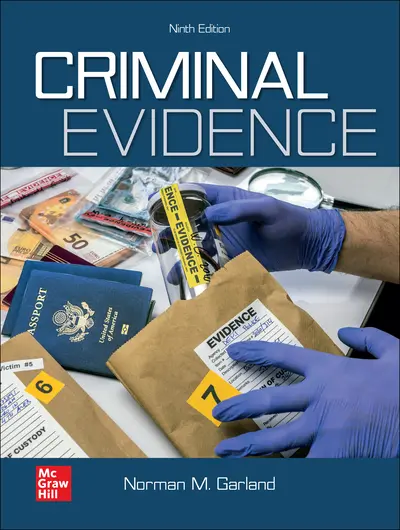My Account Details

ISBN10: 1264296800 | ISBN13: 9781264296804

Criminal Evidence, 9th Edition
- Lowest Price!
McGraw Hill eBook
Textbook Rental (150 Days Access)
- Rent for a fraction of the printed textbook price
- Complete text bound in hardcover or softcover
Loose-Leaf Purchase
Unbound loose-leaf version of full text
Shipping Options
- Standard
- Next-day air
- 2nd-day air
Orders within the United States are shipped via FedEx or UPS Ground. For shipments to locations outside of the U.S., only standard shipping is available. All shipping options assume the product is available and that processing an order takes 24 to 48 hours prior to shipping.
Note: Connect can only be used if assigned by your instructor.
Connect (180 Days Access)
- Digital access to a comprehensive online learning platform
- Includes homework, study tools, eBook, and adaptive assignments
- Download the free ReadAnywhere app to access the eBook offline
Connect + Loose-Leaf
- Comprehensive online learning platform + unbound loose-leaf print text package
- Connect includes homework, study tools, eBook, and adaptive assignments
- Download the free ReadAnywhere app to access the eBook offline
Shipping Options
- Standard
- Next-day air
- 2nd-day air
Orders within the United States are shipped via FedEx or UPS Ground. For shipments to locations outside of the U.S., only standard shipping is available. All shipping options assume the product is available and that processing an order takes 24 to 48 hours prior to shipping.
McGraw Hill eBook
Details:
- Normally the lowest price option for student
- Integrates in your LMS
- Accessible tools for students, including read-aloud functionality, jump links and dynamic note-taking and highlighting features
Textbook Rental (150 Days Access)
Details:
- Rentable option
- Hardcopy and softcover formats
Loose-Leaf Purchase
Details:
- Unbound loose-leaf version of full text
Connect (180 Days Access)
Details:
- Integrates in your LMS
- Prebuilt courses, presentation slides and instructor resources
- Test question banks, adaptive assignments, essay prompts, video content and more interactive exercises specific to your course subject
- eBook access (with included ReadAnywhere app)
- Print book add-on availability
- Remote proctoring
Connect + Loose-Leaf
Details:
- Comprehensive online learning platform + unbound loose-leaf print text package
- Connect includes homework, study tools, eBook, and adaptive assignments
- Download the free ReadAnywhere app to access the eBook offline
* The estimated amount of time this product will be on the market is based on a number of factors, including faculty input to instructional design and the prior revision cycle and updates to academic research-which typically results in a revision cycle ranging from every two to four years for this product. Pricing subject to change at any time.
Criminal Evidence presents the basic concepts of criminal evidence and their real-world application to the criminal justice system. Updated with discussions of the latest court rulings affecting the rules of criminal evidence, the Ninth Edition offers practical guidance to criminal justice professionals and criminal justice students. Attention is given to helping students understand criminal court hearings and trials—in particular, the rules of evidence, types of evidence, and admissibility of evidence at a criminal court hearing or trial.
CHAPTER 2: The Trial Process
CHAPTER 3: Evidence - Basic Concepts
CHAPTER 4: Witnesses - Competency and Privileged Communications
CHAPTER 5: Witnesses - Lay and Expert
CHAPTER 6: Credibility and Impeachment
CHAPTER 7: The Hearsay Rule
CHAPTER 8: Opposing Party’s Statements (Admissions) and Confessions
CHAPTER 9: The Exclusionary Rule - Search and Seizure
CHAPTER 10: Exclusionary Rule - Identification Procedures
CHAPTER 11: Circumstantial Evidence
CHAPTER 12: Documentary Evidence and the Right of Discovery
CHAPTER 13: Physical Evidence
CHAPTER 14: Photographic, Recorded, and Computer-Generated Evidence
CHAPTER 15: How to Testify Effectively
About the Author
Norman Garland
Norman M. Garland is a professor of law at Southwestern Law School in Los Angeles, where he teaches evidence, constitutional criminal procedure, advanced criminal procedure, and trial advocacy. He received his B.S.B.A. from Northwestern University, his J.D. from Northwestern University School of Law, and his L.L.M. from Georgetown Law Center where he was an E. Barrett Prettyman Fellow in trial advocacy. Professor Garland is a member of the Illinois, District of Columbia, and California Bars. He has had 10 years of trial experience as a criminal defense attorney, mainly in federal felony cases. In 1968, he joined the faculty of Northwestern University School of Law where he helped establish the Northwestern University Legal Clinic. He joined the faculty of Southwestern Law School in 1975 to help establish the Southwestern Conceptual Approach to Legal Education (SCALE). In the mid-1980s, he spent two summers as a deputy district attorney in Ventura County, California, where he gained experience as a prosecutor. He is coauthor of Advanced Criminal Procedure in a Nutshell (2d ed., West 2006), Criminal Evidence (6th ed., McGraw-Hill 2010), and Exculpatory Evidence (3d ed., LexisNexis 2004). He has also authored a number of computer interactive lessons for law students available through the Center for Computer-Assisted Legal Instruction (CALI).
Accessibility
Creating accessible products is a priority for McGraw Hill. We make accessibility and adhering to WCAG AA guidelines a part of our day-to-day development efforts and product roadmaps.
For more information, visit our accessibility page, or contact us at accessibility@mheducation.com
Need support? We're here to help - Get real-world support and resources every step of the way.